-
 Bitcoin
Bitcoin $109,043.9732
0.70% -
 Ethereum
Ethereum $2,614.5392
2.35% -
 Tether USDt
Tether USDt $1.0002
0.02% -
 XRP
XRP $2.3155
0.59% -
 BNB
BNB $661.3941
-0.01% -
 Solana
Solana $152.6949
1.42% -
 USDC
USDC $1.0000
0.01% -
 TRON
TRON $0.2869
0.22% -
 Dogecoin
Dogecoin $0.1710
1.54% -
 Cardano
Cardano $0.5908
1.30% -
 Hyperliquid
Hyperliquid $38.9930
-0.92% -
 Sui
Sui $2.9210
1.31% -
 Bitcoin Cash
Bitcoin Cash $499.9879
1.59% -
 Chainlink
Chainlink $13.8699
2.88% -
 UNUS SED LEO
UNUS SED LEO $9.0730
0.68% -
 Stellar
Stellar $0.2577
2.72% -
 Avalanche
Avalanche $18.4050
1.78% -
 Shiba Inu
Shiba Inu $0.0...01190
2.57% -
 Toncoin
Toncoin $2.7984
0.81% -
 Hedera
Hedera $0.1616
1.47% -
 Litecoin
Litecoin $87.4584
1.38% -
 Monero
Monero $310.1991
-2.55% -
 Polkadot
Polkadot $3.4548
1.92% -
 Dai
Dai $1.0001
0.01% -
 Ethena USDe
Ethena USDe $1.0005
0.05% -
 Bitget Token
Bitget Token $4.3312
0.87% -
 Uniswap
Uniswap $7.7222
5.06% -
 Aave
Aave $291.8778
3.10% -
 Pepe
Pepe $0.0...01026
1.63% -
 Pi
Pi $0.4606
0.21%
How do cold and hot storage affect the security of Bitcoin wallets?
Mar 25, 2025 at 05:50 am
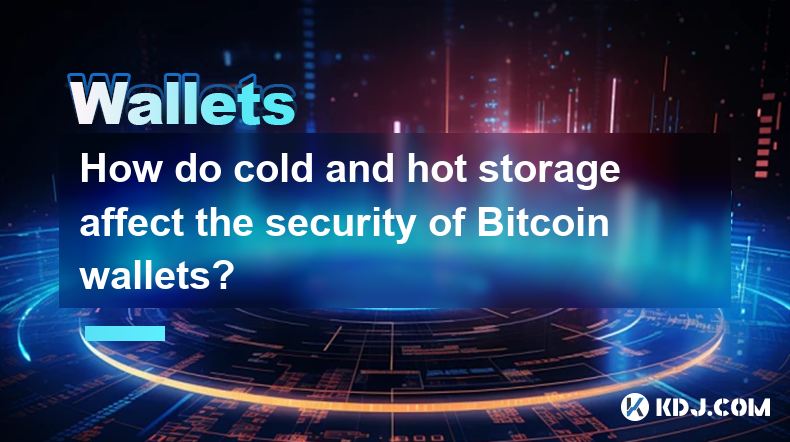
How do Cold and Hot Storage Affect the Security of Bitcoin Wallets?
Bitcoin security hinges significantly on the storage method employed. The primary dichotomy lies between "hot" and "cold" wallets, each offering varying degrees of security and accessibility. Understanding their differences is crucial for safeguarding your Bitcoin holdings.
Hot wallets, connected to the internet, offer immediate accessibility. Think of them as your everyday checking account. This convenience, however, comes at a cost. The constant online connection makes them vulnerable to hacking, malware, and phishing attacks. Examples include web wallets, mobile wallets, and desktop wallets. The ease of use often outweighs the security concerns for smaller amounts or frequent transactions.
Cold wallets, conversely, are not connected to the internet. They are akin to a safe deposit box at a bank. This offline nature significantly reduces the risk of cyberattacks. Hardware wallets, paper wallets, and even offline software wallets fall under this category. While offering superior security, they necessitate a more deliberate approach to transactions. The added security layer makes them ideal for long-term storage of significant Bitcoin holdings.
Let's delve deeper into the security implications of each:
Hot Wallet Security Concerns:
- Hacking: Online wallets are susceptible to hacking attempts targeting vulnerabilities in their software or servers.
- Malware: Malicious software can steal your private keys if your device is infected.
- Phishing: Deceptive emails or websites can trick users into revealing their login credentials or private keys.
- Exchange Hacks: If you store Bitcoin on an exchange, you're relying on their security measures, which can be compromised.
Cold Wallet Security Advantages:
- Offline Protection: The primary advantage is the lack of internet connection, making them largely immune to online threats.
- Private Key Control: You maintain complete control of your private keys, reducing reliance on third-party services.
- Enhanced Security: Cold storage significantly reduces the risk of theft through hacking or malware.
- Reduced Vulnerability: The offline nature protects against phishing scams and other social engineering attacks.
Hardware Wallets:
These physical devices offer a robust solution. They are essentially USB drives designed to store your private keys securely. They typically have a screen for verifying transactions, adding an extra layer of security. Reputable brands offer a high degree of protection. However, physical loss or damage remains a risk.
Paper Wallets:
These involve printing your public and private keys on paper. While extremely secure if stored safely and correctly, they're susceptible to physical damage, loss, or theft. Careful handling and storage are paramount. They also require a significant understanding of cryptography to use effectively.
Software Wallets (Offline):
Software wallets can be used offline, providing a decent level of security. This method requires a meticulous approach to ensuring the software remains untouched by internet-connected devices. Any interaction with an infected device could compromise the security.
Choosing the Right Storage Method:
The ideal storage method depends on your needs and risk tolerance. For small amounts and frequent transactions, a reputable hot wallet might suffice. However, for significant holdings or long-term storage, cold storage is strongly recommended. A multi-sig setup across different cold and hot wallets could be a more secure strategy.
Security Best Practices Regardless of Storage:
- Strong Passwords: Use strong, unique passwords for all your wallets and accounts.
- Two-Factor Authentication (2FA): Enable 2FA whenever possible to add an extra layer of security.
- Regular Software Updates: Keep your software updated to patch security vulnerabilities.
- Antivirus Software: Use reputable antivirus software to protect your devices.
- Beware of Phishing Scams: Be cautious of suspicious emails, websites, and messages.
Frequently Asked Questions:
Q: What is the safest way to store Bitcoin?
A: The safest method is typically considered cold storage, specifically using a reputable hardware wallet. However, even with cold storage, physical security measures like safekeeping and backups are crucial.
Q: Are hot wallets completely insecure?
A: No, hot wallets aren't inherently insecure, but they are significantly more vulnerable to online attacks compared to cold storage. The risk level increases with the amount of Bitcoin stored.
Q: Can I recover my Bitcoin if I lose my cold wallet?
A: The recovery process depends on the type of cold wallet. With a hardware wallet, recovery procedures vary by manufacturer, often involving a recovery seed phrase. Losing a paper wallet generally results in irreversible loss of funds.
Q: What are the risks associated with using a paper wallet?
A: Paper wallets are vulnerable to physical damage, loss, theft, and fire. They also require a high level of user responsibility and understanding to use safely.
Q: How do I choose a reputable hardware wallet?
A: Research well-established brands with a strong reputation for security and positive user reviews. Look for features like a secure element chip and a clear recovery seed process.
Q: Are exchanges a safe place to store Bitcoin long-term?
A: Exchanges are generally not recommended for long-term storage due to the inherent risks of hacking and exchange failures. They should be used primarily for trading and short-term holding.
Clause de non-responsabilité:info@kdj.com
Les informations fournies ne constituent pas des conseils commerciaux. kdj.com n’assume aucune responsabilité pour les investissements effectués sur la base des informations fournies dans cet article. Les crypto-monnaies sont très volatiles et il est fortement recommandé d’investir avec prudence après une recherche approfondie!
Si vous pensez que le contenu utilisé sur ce site Web porte atteinte à vos droits d’auteur, veuillez nous contacter immédiatement (info@kdj.com) et nous le supprimerons dans les plus brefs délais.
-
 M Échangez maintenant
M Échangez maintenant$0.1995
30.31%
-
 CRO Échangez maintenant
CRO Échangez maintenant$0.0942
16.18%
-
 VVS Échangez maintenant
VVS Échangez maintenant$0.0...02147
15.14%
-
 SHX Échangez maintenant
SHX Échangez maintenant$0.0117
15.12%
-
 LAUNCHCOIN Échangez maintenant
LAUNCHCOIN Échangez maintenant$0.1331
14.45%
-
 HSK Échangez maintenant
HSK Échangez maintenant$0.6708
13.82%
- Rush de l'or de Tether: 8 milliards de dollars en voûtes suisses et l'avenir des stablecoins
- 2025-07-09 02:50:13
- Utilitaire d'écuries, de manteau et de stablecoin: une nouvelle ère pour les paiements cryptographiques?
- 2025-07-09 02:50:13
- ATOM BROISSION BULLISH: Sentiment cryptographique et écosystème du cosmos
- 2025-07-09 02:55:12
- Kraken, aile arrière et Memecoins: une balade sauvage au Grand Prix de Singapour!
- 2025-07-09 00:50:12
- Cronos Skyrocket: Décodage des raisons de la surtension de la cryptographie de CRO
- 2025-07-09 01:30:12
- Le rallye d'audit d'Ethereum Wall Street et Ruvi Ai: un cocktail crypto
- 2025-07-09 00:55:12
Connaissances connexes
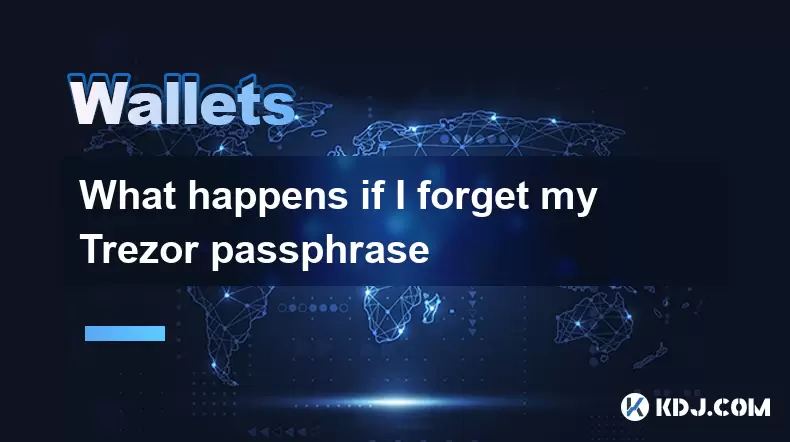
Que se passe-t-il si j'oublie ma phrase secrète Trezor
Jul 09,2025 at 03:15am
Comprendre le rôle d'une phrase secrète Trezor Si vous utilisez un portefeuille matériel Trezor , vous pouvez avoir configuré une phrase secrète c...
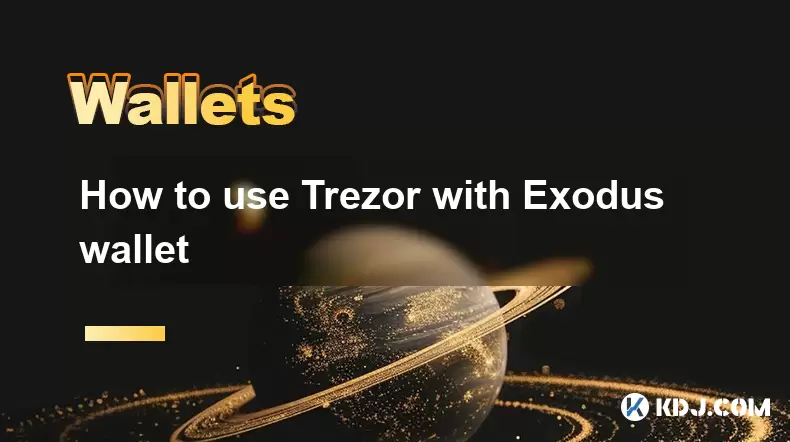
Comment utiliser Trezor avec un portefeuille Exode
Jul 09,2025 at 12:49am
Connexion du portefeuille matériel Trezor sur le portefeuille du logiciel Exodus Pour utiliser Trezor avec Exodus Wallet , les utilisateurs doivent co...
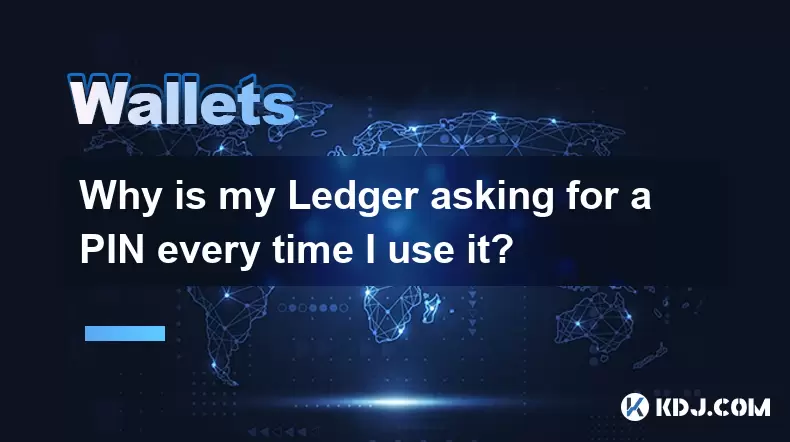
Pourquoi mon grand livre demande-t-il une épingle à chaque fois que je l'utilise?
Jul 08,2025 at 11:21pm
Comprendre le but de la broche sur votre appareil Ledger Le PIN (numéro d'identification personnel) est une fonction de sécurité cruciale intégrée...
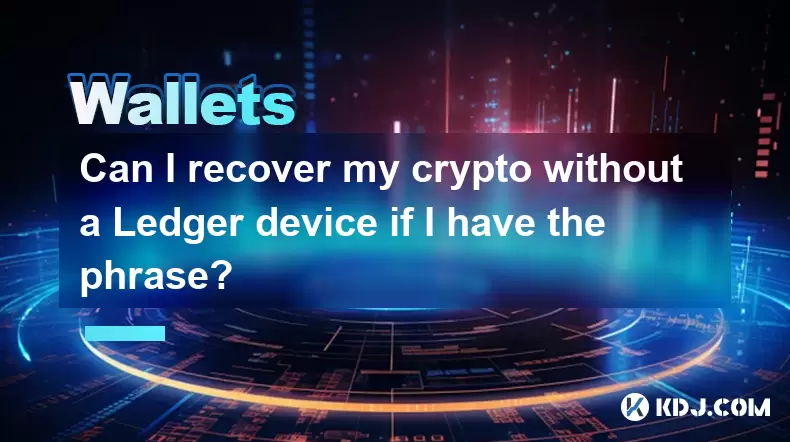
Puis-je récupérer ma crypto sans appareil de grand livre si j'ai la phrase?
Jul 09,2025 at 01:36am
Comprendre le rôle d'une phrase de récupération dans la sécurité de la cryptographie Si vous avez votre phrase de récupération mais pas de disposi...

Puis-je avoir plusieurs codes PIN sur un grand grand livre?
Jul 09,2025 at 12:35am
Comprendre les bases des échanges décentralisés (DEX) Une bourse décentralisée , ou DEX, est un type de plateforme de trading de crypto-monnaie qui fo...
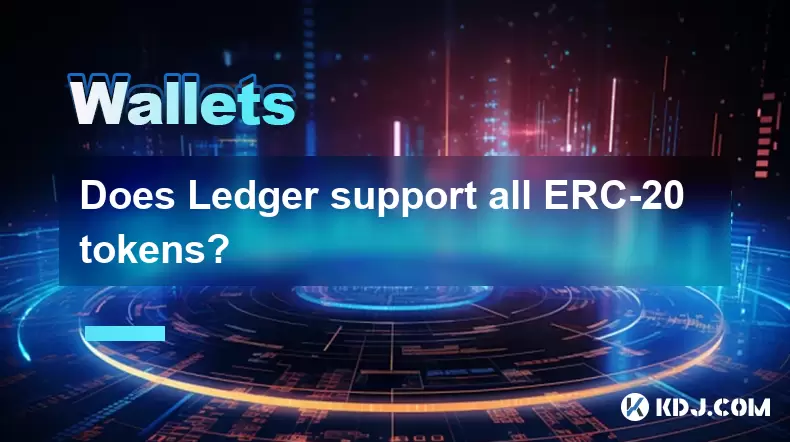
Le grand livre prend-il en charge tous les jetons ERC-20?
Jul 09,2025 at 03:42am
Comprendre les portefeuilles de grand livre et leur support de jeton Les portefeuilles de grand livre, tels que les nano-nano et ledger nano x , sont ...

Que se passe-t-il si j'oublie ma phrase secrète Trezor
Jul 09,2025 at 03:15am
Comprendre le rôle d'une phrase secrète Trezor Si vous utilisez un portefeuille matériel Trezor , vous pouvez avoir configuré une phrase secrète c...

Comment utiliser Trezor avec un portefeuille Exode
Jul 09,2025 at 12:49am
Connexion du portefeuille matériel Trezor sur le portefeuille du logiciel Exodus Pour utiliser Trezor avec Exodus Wallet , les utilisateurs doivent co...

Pourquoi mon grand livre demande-t-il une épingle à chaque fois que je l'utilise?
Jul 08,2025 at 11:21pm
Comprendre le but de la broche sur votre appareil Ledger Le PIN (numéro d'identification personnel) est une fonction de sécurité cruciale intégrée...

Puis-je récupérer ma crypto sans appareil de grand livre si j'ai la phrase?
Jul 09,2025 at 01:36am
Comprendre le rôle d'une phrase de récupération dans la sécurité de la cryptographie Si vous avez votre phrase de récupération mais pas de disposi...

Puis-je avoir plusieurs codes PIN sur un grand grand livre?
Jul 09,2025 at 12:35am
Comprendre les bases des échanges décentralisés (DEX) Une bourse décentralisée , ou DEX, est un type de plateforme de trading de crypto-monnaie qui fo...

Le grand livre prend-il en charge tous les jetons ERC-20?
Jul 09,2025 at 03:42am
Comprendre les portefeuilles de grand livre et leur support de jeton Les portefeuilles de grand livre, tels que les nano-nano et ledger nano x , sont ...
Voir tous les articles

























































































